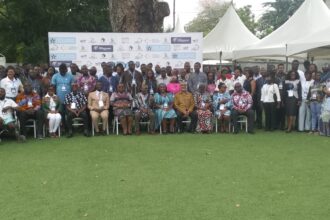The global pace of reforms toward equal treatment of women under the law has slumped to a 20-year low, constituting a potential impediment to economic growth at a critical time for the global economy, a new World Bank report shows.
In 2022, the global average score on the World Bank’s Women, Business, and the Law index rose just half a point to 77.1—indicating women, on average, enjoy barely 77% of the legal rights that men do. At the current pace of reform, in many countries, a woman entering the workforce today will retire before she will be able to gain the same rights as men, the report notes.
“At a time when global economic growth is slowing, all countries need to mobilize their full productive capacity to confront the confluence of crises besetting them,” said Indermit Gill, Chief Economist of the World Bank Group and Senior Vice President for Development Economics. “Governments can’t afford to sideline as much as half of their population. Denying equal rights to women across much of the world is not just unfair to women; it is a barrier to countries’ ability to promote green, resilient, and inclusive development.”
Women, Business and the Law 2023 assesses 190 countries’ laws and regulations in eight areas related to women’s economic participation—mobility, workplace, pay, marriage, parenthood, entrepreneurship, assets, and pensions.
The data—which are current through October 1, 2022—offer objective and measurable benchmarks for global progress toward legal gender equality. Today, just 14 countries—all high-income economies—have laws that give women the same rights as men.
Worldwide, nearly 2.4 billion women of working age still do not have the same rights as men. Closing the gender employment gap could raise long-term GDP per capita by nearly 20% on average across countries. Studies estimate global economic gains of $5-6 trillion if women started and scaled new businesses at the same rate as men do.
In 2022, only 34 gender-related legal reforms were recorded across 18 countries—the lowest number since 2001. Most reforms focused on increasing paid leave for parents and fathers, removing restrictions to women’s work, and mandating equal pay. It will take another 1,549 reforms to reach substantial legal gender equality everywhere in the areas measured by the report. At the current pace, the report, notes, it would take at least 50 years on average to reach that target.
The latest Women, Business and the Law report provide a comprehensive assessment of global progress toward gender equality in the law over the past 50 years. Since 1970, the global average Women, Business, and Law score has improved by about 2/3, rising from 45.8 to 77.1 points.
The first decade of this century saw strong gains toward legal gender equality. Between 2000 and 2009, over 600 reforms were introduced, with a peak of 73 annual reforms in 2002 and 2008. Since then, reform fatigue seems to have set in—particularly in areas that involve long-established norms, such as the rights of women to inherit and own property. A new analysis of the data shows that economies with historically larger legal gender gaps have been catching up, especially since 2000.
Currently, equality of economic opportunity for women is highest in OECD high-income economies but important reforms have continued in developing economies. Sub-Saharan Africa made significant progress last year. The region accounted for over half of all reforms worldwide in 2022, with seven economies—Benin, the Republic of Congo, Côte d’Ivoire, Gabon, Malawi, Senegal, and Uganda—enacting 18 positive legal changes.
Although great achievements have been made over the last five decades, more needs to be done worldwide to ensure that good intentions are accompanied by tangible results —that is, equal opportunity under the law for women. Women cannot afford to wait any longer to reach gender equality. Neither can the global economy.
Source:myjoyonline














